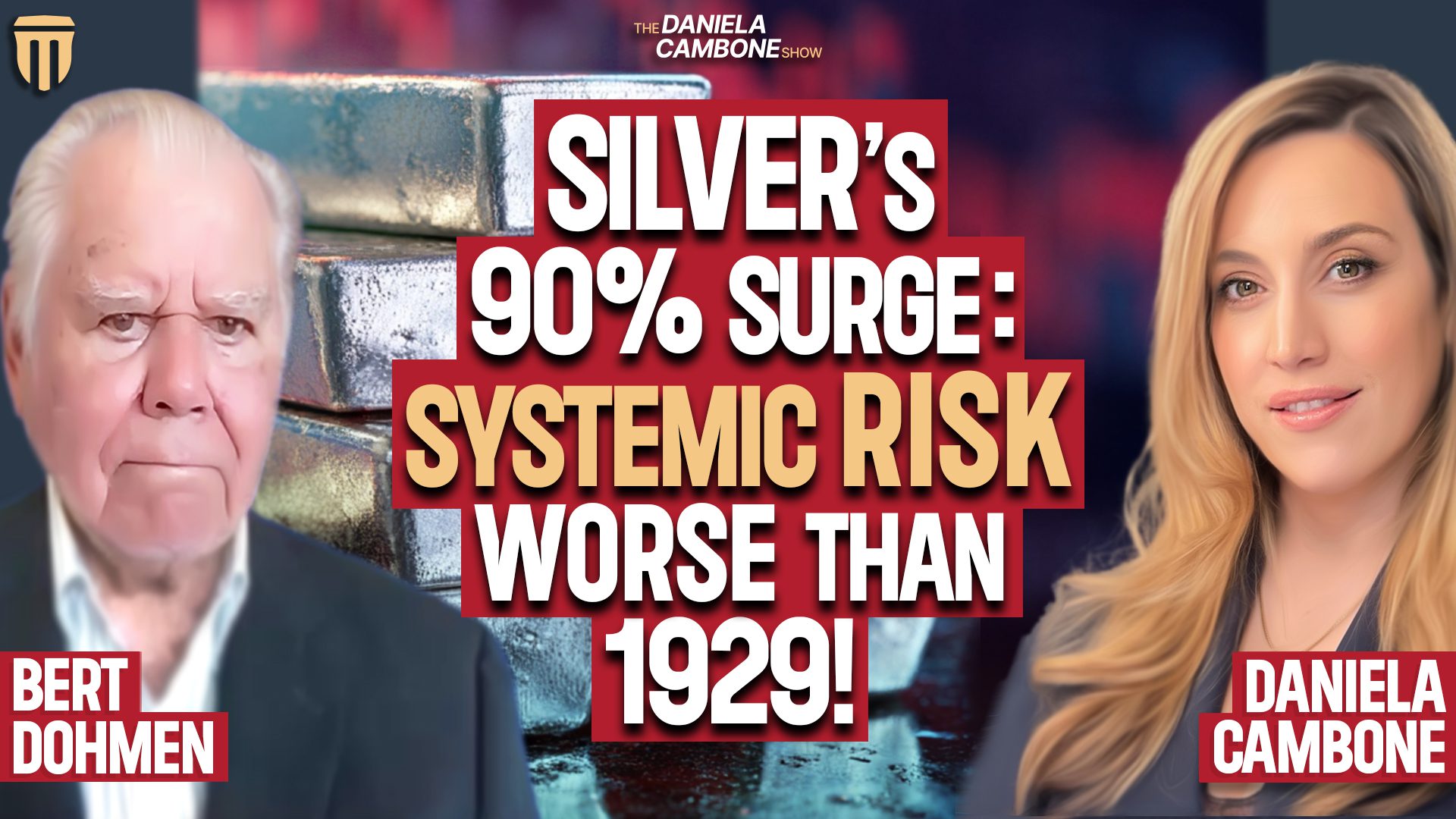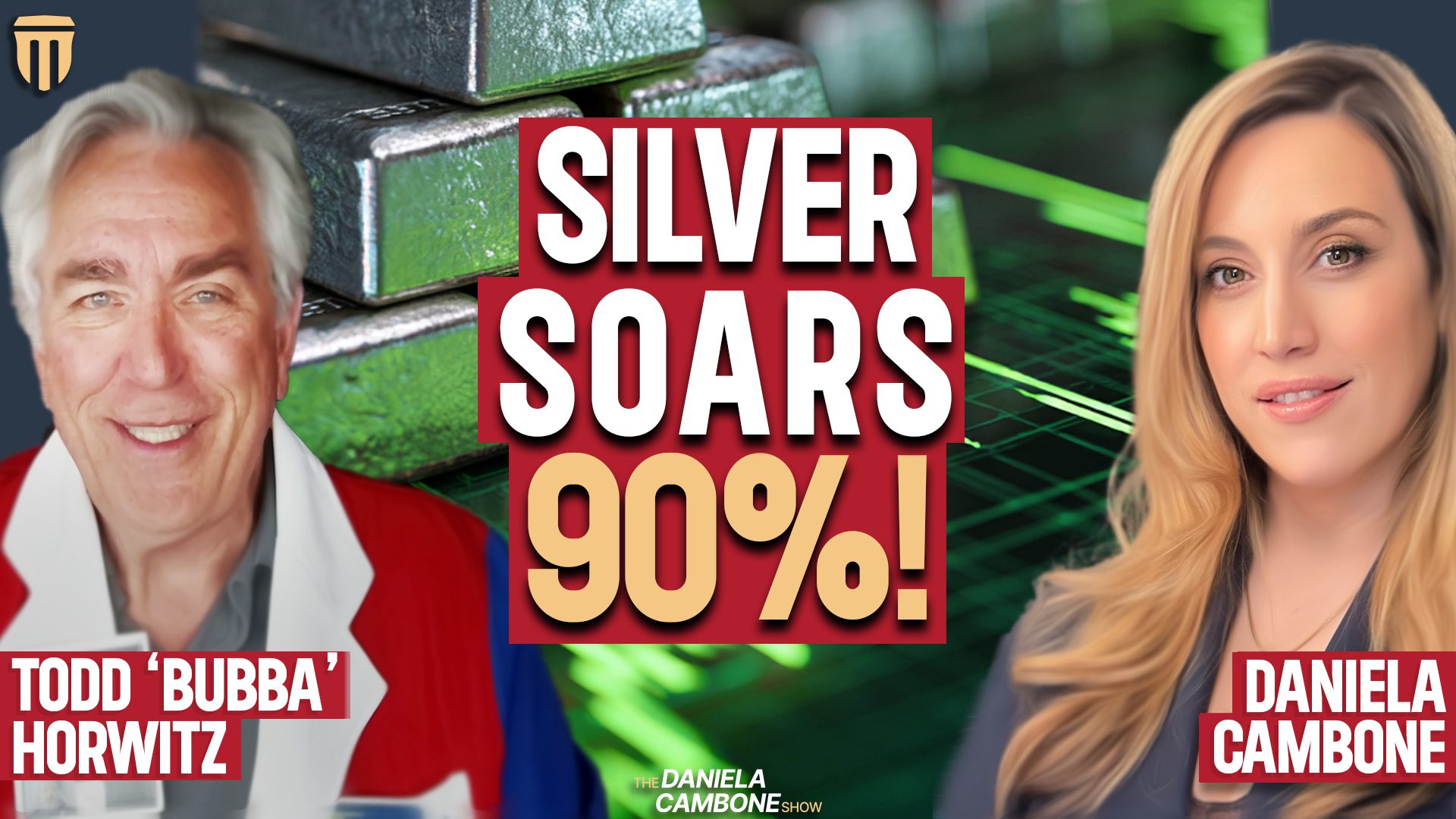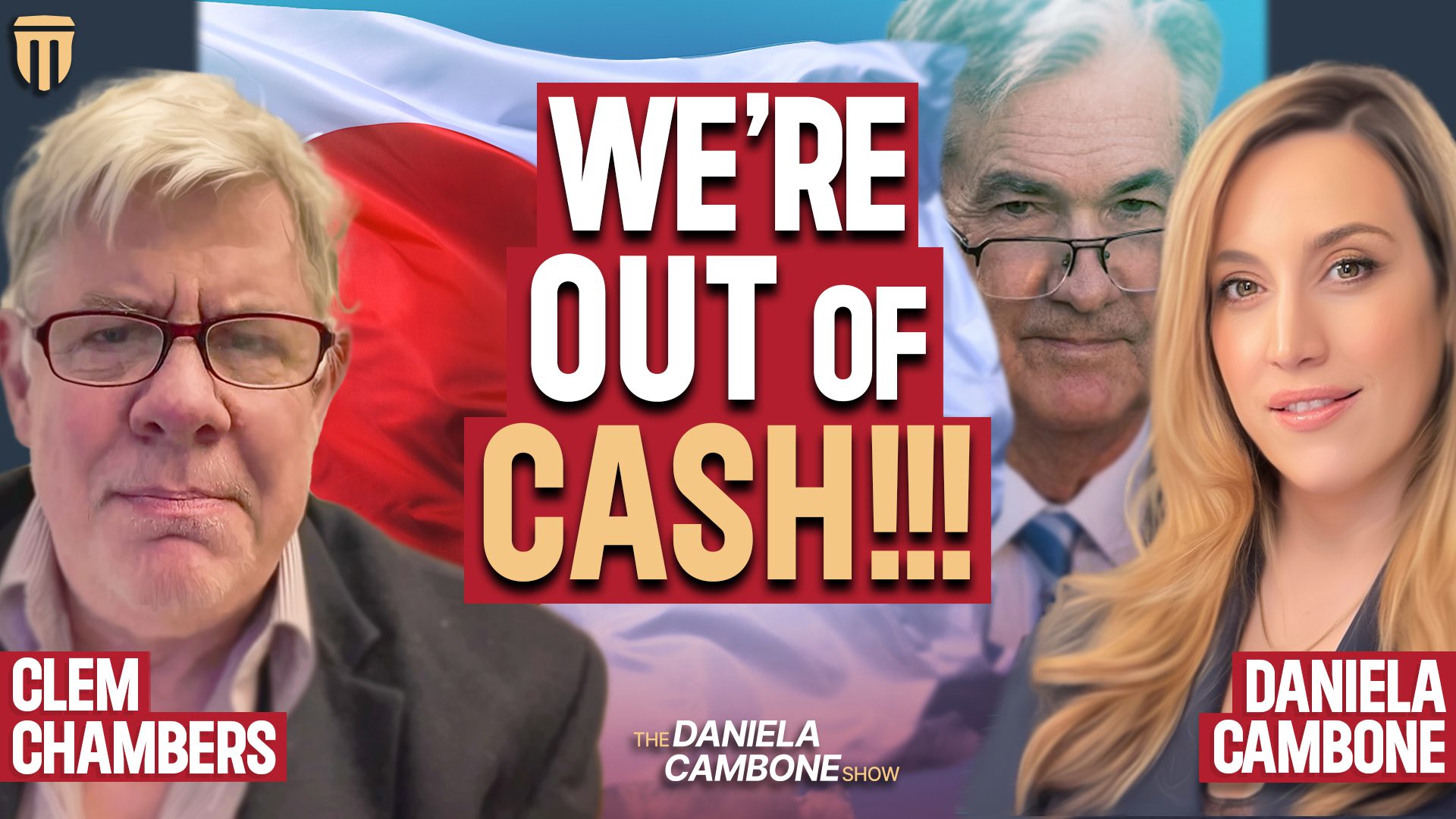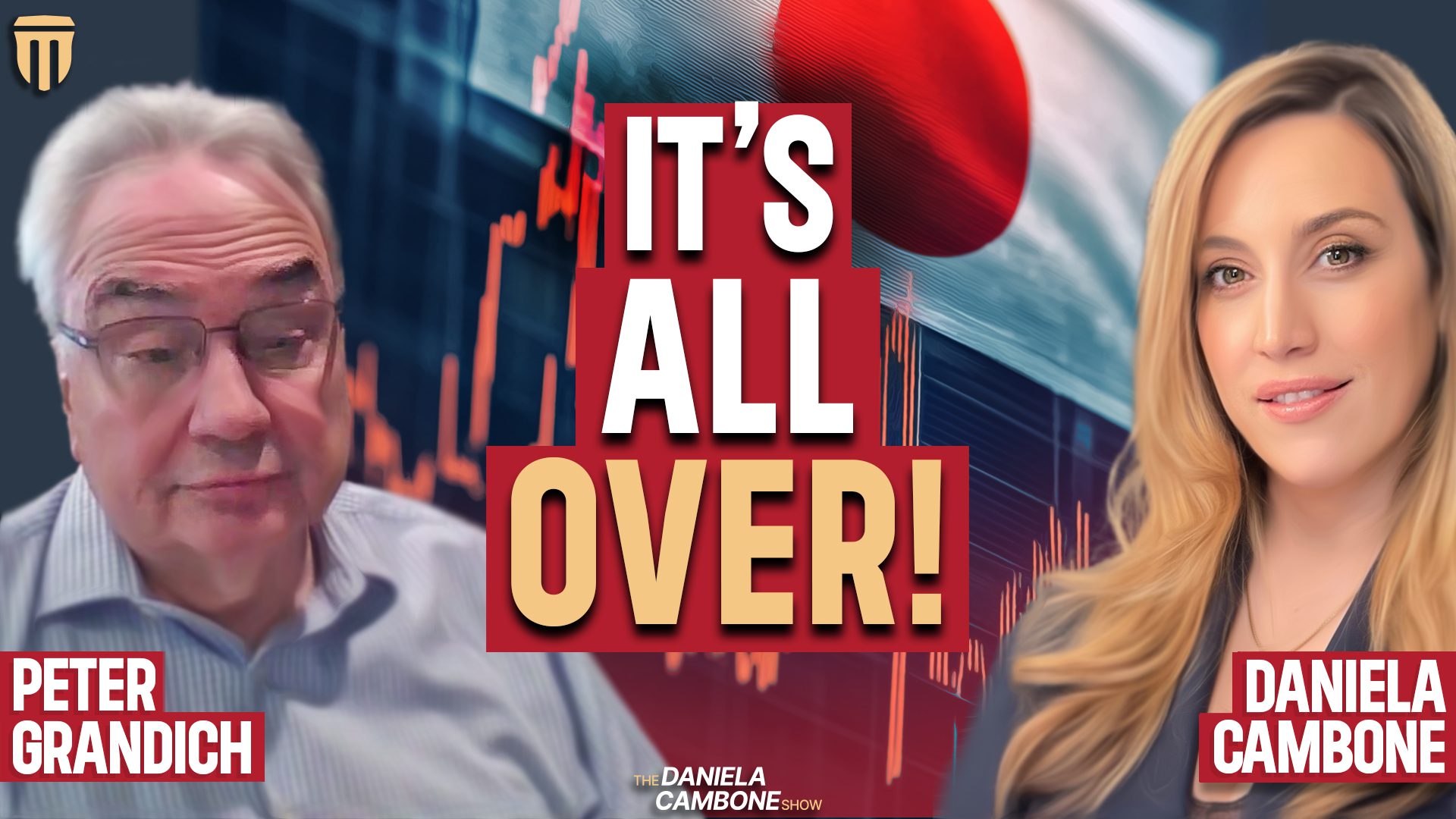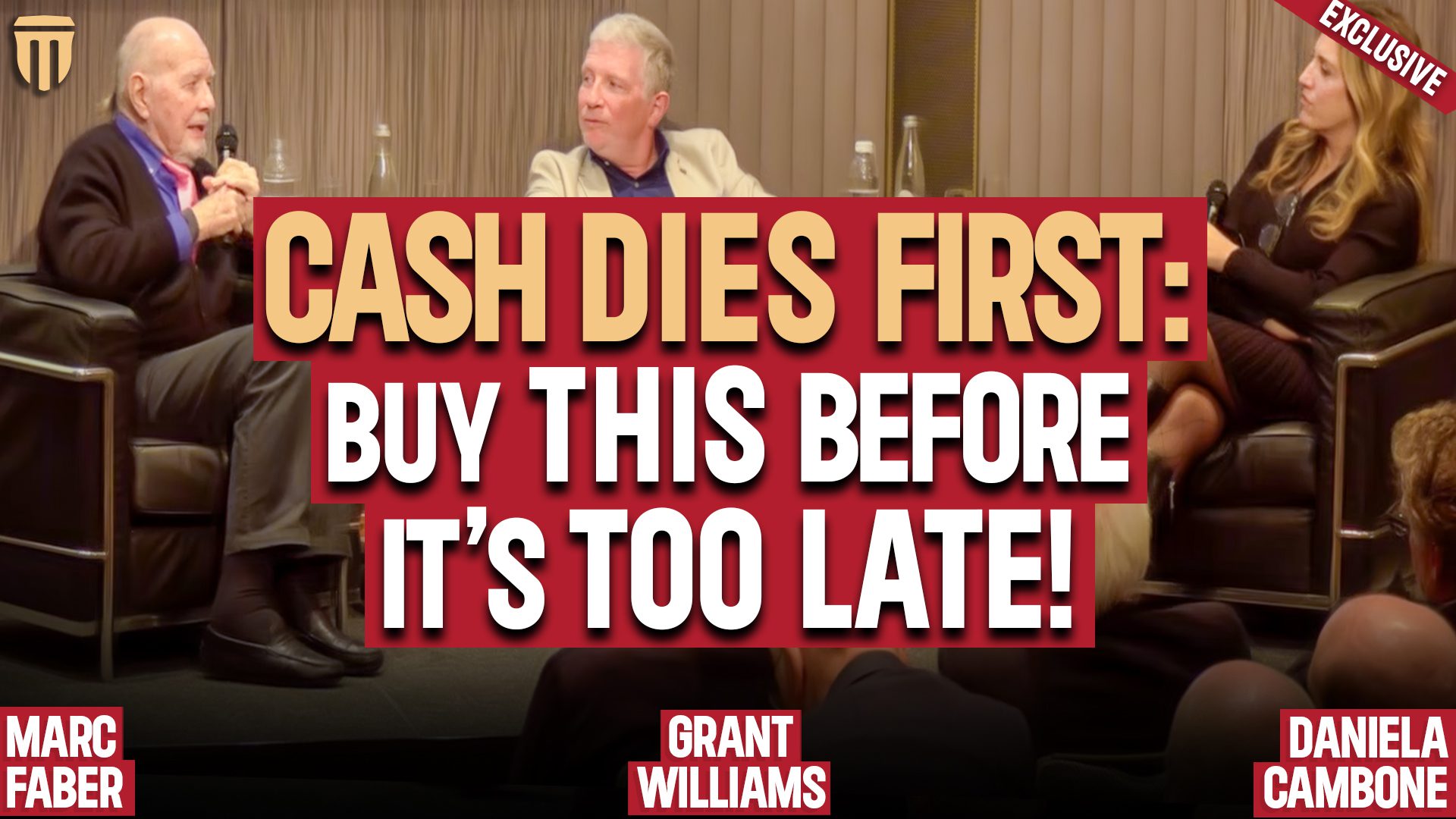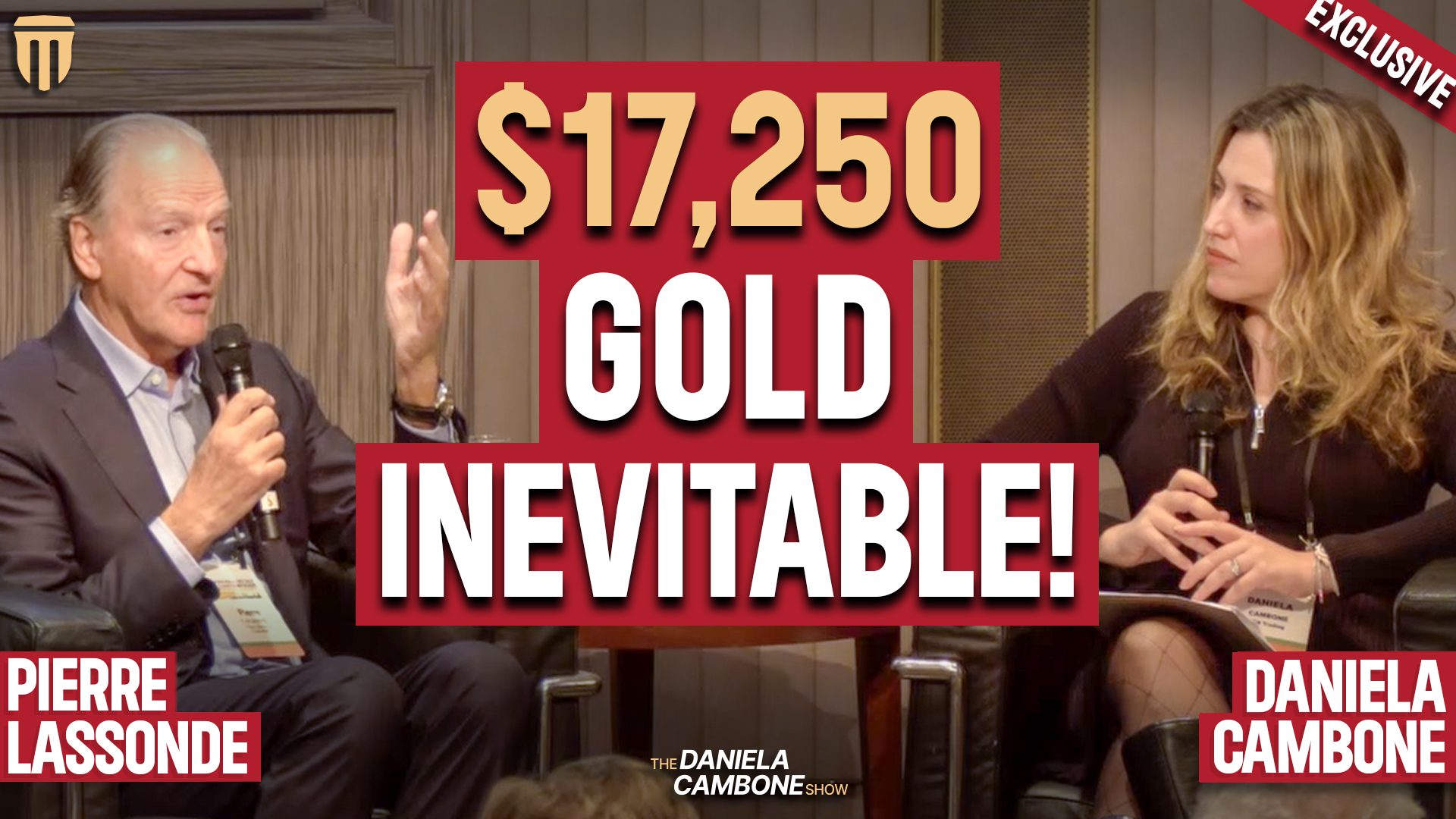Rick Rule: $100 Trillion Dollars in Liability; Why This is Far Worse Than Post Vietnam Dollar Crisis
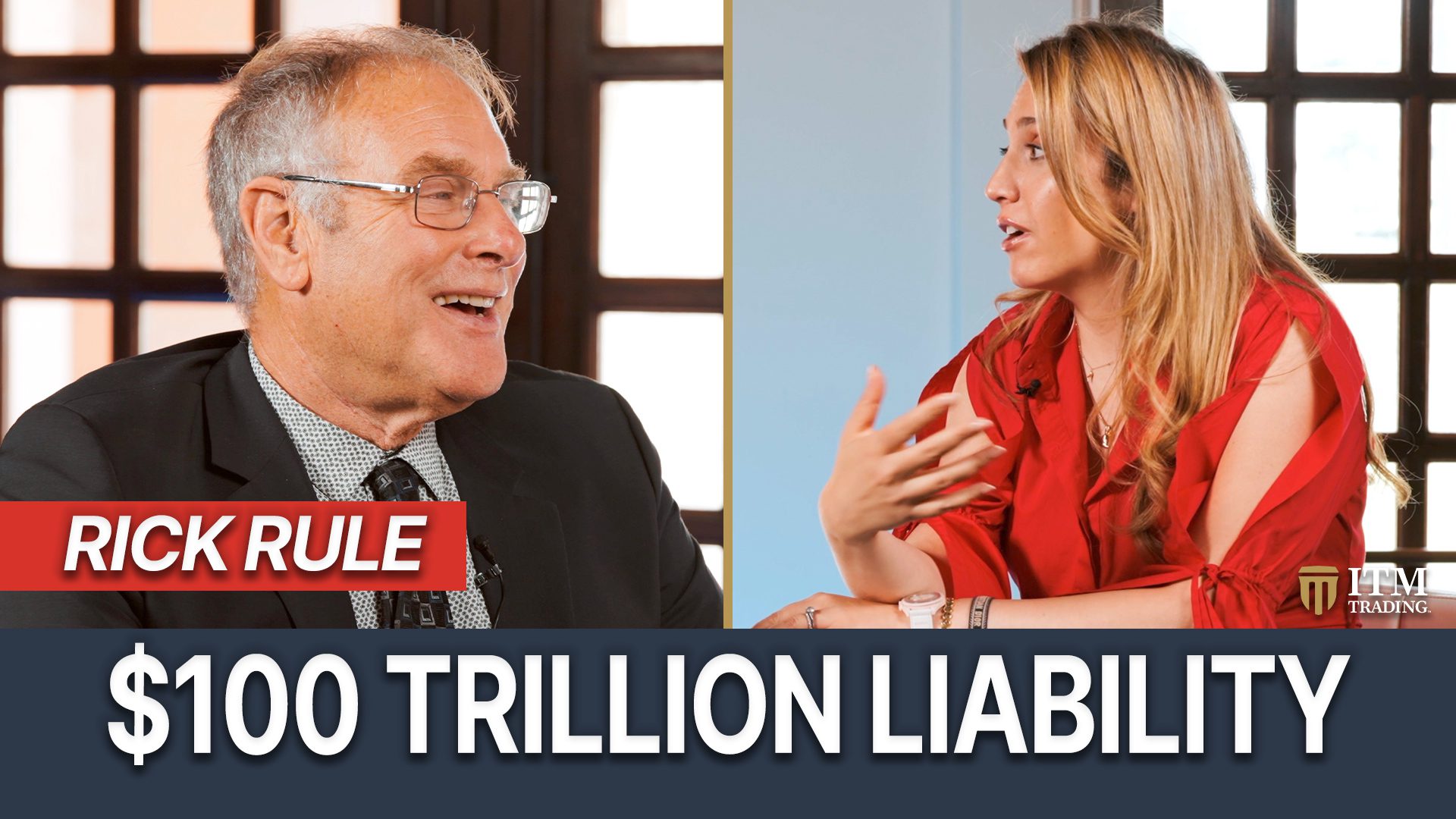
“The U.S. dollar will lose substantial purchasing power in the next 10 years,” warns Rick Rule, founder and CEO of Rule Investment Media. During this year’s Rule Symposium in Florida, he explained to Daniela Cambone that exploding liabilities, including $100 billion in entitlements such as Medicare, Medicaid, and Social Security, are likely to greatly devalue the U.S. dollar. Rule also emphasized the importance of owning gold to hedge against future uncertainties. “I own gold because I’m afraid it’s going to go to $8,000 or $9,000 or $10,000. I really want to be wrong. And you own gold hoping you’ll never have to sell it,” he concludes. Watch the powerful video to learn more about his thoughts.
CHAPTERS:
00:00 US debt
5:20 Breaking point for US debt
6:55 US dollar
9:36 BRICs
13:00 Retail investors’ interest in gold
17:12 Concluding words
TRANSCRIPT FROM VIDEO:
00:00
I absolutely positively believe that the US dollar will lose substantial purchasing power in the next 10 years. The period 1982 to 2022 was probably the most benign epoch in human history. I own gold because I’m afraid it’s going to go to $8,000 or $9,000 or $10,000. I really want to be wrong.
00:24
And your own gold hoping you’ll never have to sell it. Exactly. And think about an insurance asset, life insurance. That means somebody died, okay? This is not a good outcome. But if it happens, you want to get paid.
00:44
Hi, this is Daniela Cambone and welcome back to the Daniela Cambone show on the road. We love being on the road in Boca Raton at the Rick Rule Symposium. And I am now with really, well, you are the man behind one of the most coveted and iconic events in the sector. How does it feel to carry that crown? Well, I guess it feels good. I guess I take the bow and I take the blame. The truth is that the conference has gone on for 20 seconds.
01:11
20-something years. Wow. And there have been a whole bunch of people responsible for the success. It bears my name. But the truth is, it goes back to the days of Agorah when they did a good job, and my staff is superb. They are superb. And I can’t believe this is the first time I’m attending this show. I mean, I’ve been covering this space for so long, but I’m happy, well, that you invited me. And that… Now, Daniela, in some fairness, this isn’t the first year that you’ve been invited. No.
01:35
Well, the kids are a little older now. It’s a little easier to escape. And I have to say, sold out conference. I mean, not an empty seat. And you really don’t see that anymore in the mining space. So that’s why I really want to say, chapeau to you. Congratulations on that. Want to talk, obviously, the precious metal sector and all that. But I want to start with one of your recent quotes, because there’s so much. A lot of the talk was surrounding the US debt. And I’m happy it’s happening here, because it’s not happening on the election platform. Right. Right?
02:04
And that’s a scary thought, but at least people are paying attention here. And you said, we came into the 1970s having fought the war in Vietnam, which we lost, and the war on poverty, which we lost. What we had left over was unsustainable debt. And we dealt with that by devaluing the US dollar by over 80%, which is precisely what we’re doing now. $34 trillion in debt and counting as we speak.
02:31
You know, Joel Lippman’s here, your keynote speaker. He’s not losing sleep over the debt, but I think you are, perhaps. I don’t, the $34 trillion problem is one problem. To me, the larger problem is the net present value of entitlements, Medicare, Medicare, well, looking at the camera, old folks like me. The net present value of the off balance sheet liabilities of the US government.
02:58
Medicare, Medicaid, Social Security, federal government pensions, stuff like that, exceeds $100 trillion. This isn’t Joel Littman’s estimate or Rick Ruhl’s estimate. This is the estimate of the Congressional Budget Office, who by the way have traditionally underestimated that liability. That bothers me. When I look at the world outside of the collective, which is to say outside of government, I’m extremely positive.
03:27
In the United States, we have a society that’s so creative that a group of teenagers could take over a garage in Sunnyvale out pops Google. Thus far, our individual tenacity and creativity has funded our collective stupidity. What has changed between now and the 1970s is that in 1970, in the decade of the 70s, the on-balance sheet liabilities of the US government was about 25% of GDP. Now it’s 110%. I share.
03:57
much of Littman’s.
04:01
How would you say, positivity in the long term? I’m concerned about the near term. Because yes, his main argument is we have, in his view, a healthier economy, a stronger economy than we had in the 70s. He’s the, that’s the reason I have him here. Right. You know, too often in my conference, the theme is gonna be, the world’s gonna end on Thursday, here’s how you can profit. Right. I look at the economy that we have in terms of the strength.
04:31
And, Daniella, it works for you and I. It works for people who have skill sets that generate real utility in the economy. There are too many people in this economy who don’t have the skill sets. They aspire to the same lifestyle that you have and the same lifestyle that I have, but they don’t have the ability to generate enough utility for others that they can make the income that we do. And it’s not working for them. I look in the little village that I live in in Washington, there’s a labor shortage there.
04:59
And somebody who starts at Safeway makes $20 an hour, which sounds like a lot of money in the dollars that you and I were brought up with. But $20 an hour in my little village isn’t a living wage. So while the economy is working for you and I, it isn’t working for a lot of Americans. And a lot of Americans resent that. And I know you argue with a lot of folks on Twitter about your response as always, why don’t you lower taxes? Right. But that’s never going to happen. I suspect it won’t.
05:27
And by the way, I do this on Twitter for amusement and educational purposes. I know, I love that. But you’re making a point. But I want to go back to that $100 trillion that you’re worried about. How much more does it tick up? Where’s the breaking point? What happens when the dam breaks? I don’t know. I’m a credit analyst. If you look at the world the way I do, is the debtor going to be able to pay you back? The answer is no. I suspect that the actuarial response, I mean, I suspect what happens is two things. I think we have a replay of the 1970s in the sense.
05:57
that I think the purchasing power of the U.S. dollar goes down, which is to say the nominal hundred trillion dollar liability stays in place, but we pay it back with a currency where the purchasing power declines. People forget that in the decade of the 1970s, the purchasing power of the U.S. dollar fell by more than 80%. So I think that’s part of the answer, sadly. I think the other part of the answer is that they will absolutely means test Social Security, which is to say that people who’ve made a lot of money and paid into it won’t get anything out.
06:27
And I think they have to raise the age limit. What they do about health care costs is going to be a very interesting challenge. Health care has become very politicized in the United States. And I don’t, obviously, as you know, Danielle, I’m not a political analyst. And I don’t understand how you resolve, as an example, the age debate. My generation voted ourselves all kinds of cool benefits. We forgot to pay for them. So we’re leaving your generation with a bill.
06:54
Well, that’s why I always recall that time you came on my show and said, 15 years from now we’ll be living in a better world. I think back to that because, honestly, Rick, I have such a hard time seeing that right now. The history I’m going to give you is before you were born, right? In the 1970s.
07:19
The truth is the 1970s were ugly. We had civil strife in the United States by civil strife. I mean riots in the streets. I decided to go to school in Canada because I lived in California. I didn’t want to wear a gas mask to get to class. You know, that kind of stuff. We devalued the dollar in a closet sense by 80%, but we got through it. And I’m not sure how we get through this. Part of me says over 15 years, we grow our way out.
07:48
I’m hoping in a very positive sense that like Churchill said, Americans always do the right thing when they’re left with no other alternatives. But you’re bringing up a good point. The dollar was devalued, right, over 80 percent, but it survived. It went on to strive. So talk to me about many experts who come on saying this will be now the end of the dollar. I mean, maybe we’ll just have a crazy devaluation.
08:16
But it won’t necessarily kill it? I don’t think so. I think the dollar will be the world’s reserve currency for the rest of my life. For the record, I’m a very healthy 71-year-old. Because look at the competitors. Doug Casey famously said, the US dollar is the worst currency in the world with the sole exception of every other currency. I don’t think that we’re going to get through this easily. But I do believe that a society that is as clever as ours…
08:42
with the distribution of intelligence as broadly spread as ours will do well. I also believe that there is increasingly a globalization of opportunity and skill. And my hope, and I have to say it’s a hope, is that my hope is that a rise in living standards in places like Malawi and Brazil and Nigeria and Indonesia is as profound as the increase in living standards in China was. And I hope, too.
09:12
that that globalization of opportunity will make everyone, including Americans, richer. Now, that may be a naive hope. As I say, I have observed that, over time, our individual creativity has financed our collective stupidity. If I’m wrong, the outcome is truly ugly. Not to bring up the bricks again, but I will bring up the bricks again, because…
09:40
Since the last time I spoke, there’s always new developments. New countries have been added. We’re inching closer to their summit. And I know many say it’s just a nice, I had one guest on equating it to the Power Rangers, that it’s just a nice group or philosophy, but it won’t ever amount to anything. But fresh news out of Moscow, and again, it’s news out of Moscow, so take it with a grain of salt, that they are working and inching closer towards forming some sort of a united currency, perhaps some sort of euro for that.
10:09
for the BRICS. Thoughts on the BRICS? And do you see a future currency emerge from that that could challenge the US dollar? No, in a word. I think the euro has been a slow motion failure. And I think the failure of the euro will continue to escalate. Again, Doug Casey says the US dollar is an IOU nothing.
10:35
The euro is a who, is you nothing, and the bricks is that nobody owes you anything. Think about the constituents to that. Non-convertible currencies, countries that don’t trust us but trust each other less, a marriage of convenience, not a marriage of love. Imagine as an example, a currency that nobody’s obligation, that everybody takes the credit for, nobody takes the blame for. Imagine that the constituents
11:05
have no reserve liability to it. Now imagine that you’re the Chinese and you run up the US dollar equivalent of a hundred, of a trillion dollars trade surplus with Russia. There’s only so much vodka you can import. What do you do with the balance? What will happen is if they even settle bilaterally, which is to say they settle in Rubles and Yuan, ultimately they will convert one or the other of those into something they can spend, which is a US dollar.
11:35
The U.S. dollar for all its fault is the only liquid, transparent currency in the world. The U.S. treasury market for all its fault is extremely liquid and extremely transparent, and there is no other financial instrument in the world that comes close to it. It is set up so perfectly, this ecosystem, that it cannot fail? No, it’s that it has no competition.
12:04
It is in a slow motion fail as opposed to a rapid fail. Let’s take it from this angle. Let’s play out the scenario that Japan doesn’t want to be a buyer of US debt anymore, right? Then the Fed were to step in and be the buyer of last resort. The Fed steps in. Then what happens to the dollar? We’ve seen that before. I mean, I absolutely positively believe that the US dollar will lose.
12:33
substantial purchasing power in the next 10 years. I don’t think it’ll lose as much purchasing power as the yen does. I don’t think it’ll lose as much purchasing power as the British pound does. I don’t think it’ll lose as much purchasing power as the euro, but I think it will continue to lose purchasing power, which is to say, again, quoting Doug Casey, the prettiest mayor at the slaughterhouse. And this is why, is it fair for me to say, you believe in gold? That is why I believe in gold. So tell me this.
13:02
as one of the greatest minds in the sector. Gold price where it is and challenging all correlations, yields, US dollar, whatever interest rates are doing, gold’s at a great price, right? Yet the retail investor in North America is not biting. Right? China gets it. What happened to the retail investor in North America, even just compared to a year ago, where the appetite was there?
13:31
Wonderful question. I think it has to do with 40 years of conditioning. The period 1982 to 2022 was probably the most benign epoch in human history, particularly for American investors. The US dollar had a hegemony. We had continuing rate cuts. It was a wonderful set of circumstances. Anything that went wrong in our country, we could print it away, people would buy it. So we exported our difficulties to other places. I think that ended it.
14:00
in 2022. If I am right, it takes me back again to the decade of the 70s. In 1967, inflation was present. People noticed it. They had this thing called whip inflation now, win, which they didn’t do. But it took the period 1967 to 1972 for Americans to understand the compound perniciousness of inflation.
14:28
They had been schooled in 20 good years since the end of World War II to expect that things got better and better and better. While they were expecting things to get better, the price of a debt gallon of gas went from $0.20 to $1. It took them five years to understand the ravages of inflation on their savings and on their paychecks. But when they came to understand it in 1972, they understood it in earnest. My suspicion is that we are going to experience the same delayed reaction for the same reason.
14:58
We are conditioned to look at the economy, to look at markets by the period 1982 to 2022, which was pretty damn good. The consequence of that is that the writing that we see on the wall doesn’t scare us as much as it otherwise would. During the decade of the 70s, by 1980, everybody expected the world’s worst possible outcomes, which is of course when things started turning good.
15:28
And I think that’s the situation. I think that we have been conditioned to expect things in the future that we’ve experienced in the immediate past. And that has inured us to the lessons of history. That makes a lot of sense. And add to that, I mean, would you add to that what’s happening with stocks like Nvidia, that people are just drawn to what they see as the big ticket winners? Which is exactly what happened.
15:54
decade of the 60s, the nifty 50, the great big American growth companies, were the invidias of the 1960s. And people were inclined to believe in American hegemony, they were inclined to believe in American technology, they were inclined to believe that things went better and better and better. They had the hubris, as you quoted, to fight the war in Vietnam, which of course they lost, and the war on poverty, which they lost too. This isn’t to suggest that we’re going to lose big time, but we’re going to win a lot less aggressively. By the way…
16:23
Daniela, I have to say, I hope with regards to gold I’m wrong. I own gold for insurance purposes. I don’t own gold because I think it might trade from 24 to 27. I own gold because I’m afraid it’s going to go to $8,000 or $9,000 or $10,000. I really want to be wrong. And you own gold hoping you’ll never have to sell it. Exactly. Think about an insurance asset, life insurance. That means somebody died, okay? This is not a good outcome.
16:52
But if it happens, you want to get paid. Yeah, well, that’s why it angers me when I see certain bullion dealers I shall not name, who will say, you know, sell your gold, take your dream vacation, buy your dream car. And I think that’s just such a miseducation of what the role of gold should really be. I agree with that. I completely agree with it. I’ll let you get back to your conference. I was telling you.
17:16
offline, I ran into one conference girl who said, this is the show to attend. And basically, whatever Rick Rule likes, you just need to follow. I said, that’s a tremendous responsibility. Yeah, I think it’s a mistake. What I hope people get out of Rule Investment Media, the Rule Classroom, the conference, is an individual’s responsibility to look after himself or herself and their family.
17:39
And the role of the conference is to educate you on how to do that. The role of the conference is not to make me a guru. Remember, I’m the guy who failed retirement. Big time. So what we’re trying to do is educate a whole class of investors. By the way, I’m delighted to say that there are two different families here.
17:59
with three generations at the conference, grandparents, parents, and kids. I met them, they stopped me. It’s just wonderful. Yeah, one of them wanted me to meet their grandson and I thought, this is awesome. I mean, that’s really truly what we’re all about. We’re trying to give people the lessons so they don’t have to rely on gurus. If somebody buys a stock because Rick Ruhl said to buy it, how will they know when to sell it? I thought it was incredible. Speaking to the 17 year old I met, I could see like he was glossed over so much information and I said,
18:27
One day it will all make sense. I know it doesn’t make sense right now, but one day you’re gonna thank your grandparents and what incredible grandparents. Rick Rule, congratulations. You’re the man of the hour. You have a boat cruise happening tonight. I’ll be on it. Can’t wait. And thank you for inviting me. Thank you. Thank you for all your contributions to the Rule classroom over the years. Your assistance in terms of spreading our message has been.
18:52
invaluable. So thank you both for your efforts and for your friendship. It means a lot. Yeah, it means a lot to me too. And thank you all for watching. We’ll have more great content coming from the Rick Rule Symposium here in Boca Raton. So be sure to stay tuned to the Daniela Cambone show on ITM Trading.
SOURCES:
https://www.nasdaq.com/articles/how-would-new-brics-currency-affect-us-dollar-updated-2024
